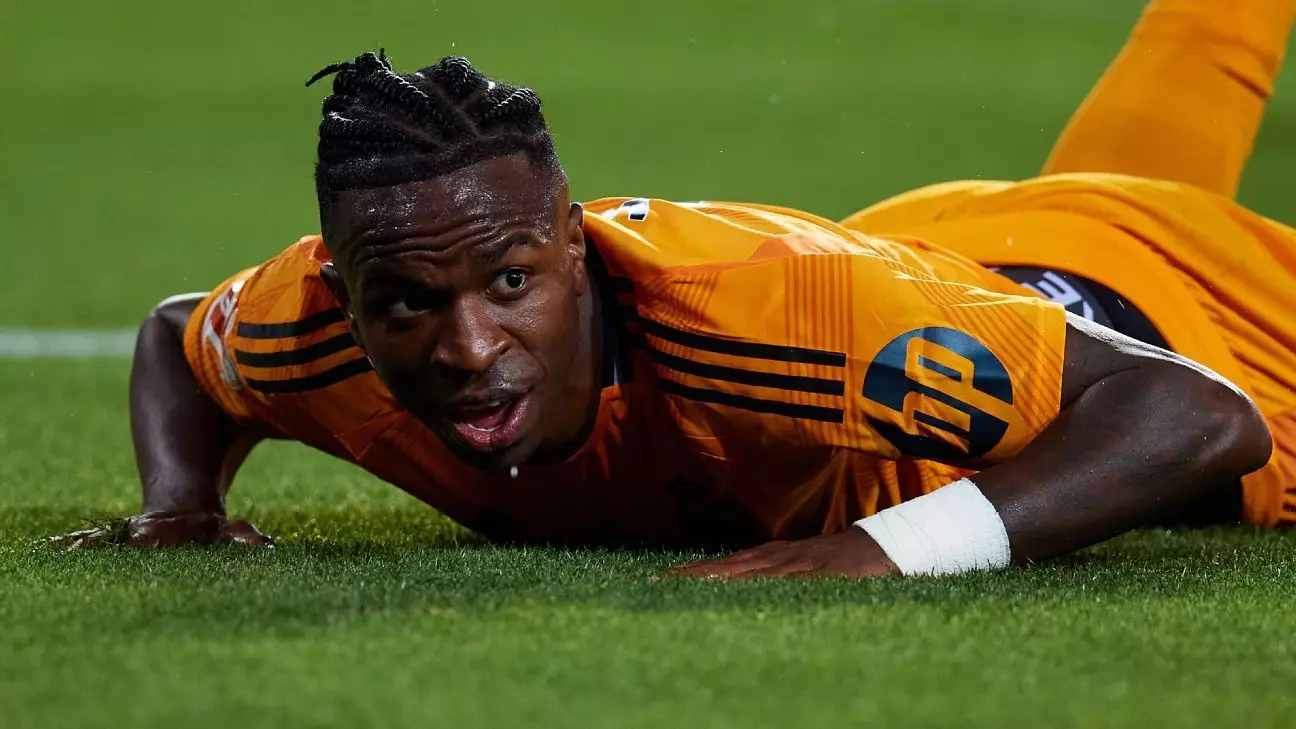Vinicius Junior, the Brazilian wonderkind playing for Real Madrid, finds himself at a perplexing intersection of brilliance and scrutiny. His recent red card and ensuing two-match suspension have ignited debate surrounding his character and the broader implications of race within professional sports. To navigate through this controversy, one must separate the player’s undeniable talent from the external judgments thrust upon him—and examine how his prodigious skills juxtapose with societal expectations and biases.
Statistics reveal a stunning narrative: nearly 300 club appearances resulting in 180 goal contributions—either directly through goals or assists—along with 14 trophies at such a nascent stage in his career. Yet, despite this formidable resume, Vinicius faces relentless backlash, particularly related to disciplinary actions. His recent expulsion from the game against Valencia is only the second red card of his career. In stark contrast, Sergio Ramos—one of Real Madrid’s legendary figures—accumulated ten red cards during his early time at the club. This discrepancy raises pertinent questions: Why does Vinicius receive a harsher critique for his outbursts, while Ramos is largely dismissed as a ‘wild boy’?
The truth lies not only in discrepancies in their perceived behaviors but also in the broader societal lens through which they are viewed. Ramos’ infractions were often attributed to passionate competitiveness, while Vinicius’ reactions tend to be framed as indicative of immaturity or emotional fragility. This double standard merits scrutiny, particularly as Vinicius navigates a landscape laden with prejudiced perceptions.
An important element to consider is the racial dynamics at play. While Ramos embodies a privileged position as a white Spanish player, Vinicius is a Black Brazilian, who has faced a spectrum of discrimination during his career. Instances of racist abuse have marred his journey, creating an environment where his emotional responses are magnified and criticized more sharply than those of his white counterparts. The discourse surrounding defensive aggression versus emotional responses could be seen as eerily reflective of deeper racial biases in society at large.
In their respective styles of play, Ramos often received recognition for his aggressive defensive tactics, while Vinicius’ emotional responses to provocation are chastised. The media narratives surrounding their actions draw a stark line between reckless abandon and emotional fragility, which not only impacts their reputations but also influences how fans interact with them.
Real Madrid coach Carlo Ancelotti’s observations of Vinicius provide an interesting counterpoint to the narrative crescendo surrounding the player. Ancelotti insists that Vinicius is maturing, attempting to manage his reactions more effectively. He stated that, in light of the insults hurled at the forward during games, it’s a considerable challenge for Vinicius to maintain composure. Ancelotti’s emphasis on growth and understanding is often overshadowed in media coverage that gravitates towards sensationalism and controversy.
One wonders whether the club can do more to shape the narrative around Vinicius. The recent comments from Real Madrid’s TV outlet criticizing the integrity of the league can arguably heighten tensions, contributing to an ‘us against them’ mentality that could fuel overreactions on the pitch. Encouraging a more balanced dialogue could assist in providing a safe space for Vinicius to express himself while also reducing the fuel for criticism.
Vinicius exists in an exceptionally high-pressure environment where the expectations are monumental, not only as a player but also as a symbol for many fans. Juggling the roles of a superstar athlete, a potential figure for racial equality, and a young man navigating life in the spotlight places an immense burden on him. Balancing the excitement of his game-winning capabilities with the permanence of public scrutiny presents an ongoing struggle.
While discipline is necessary, it’s vital to allow room for personal growth. Vinicius’ emotional responses, while sometimes inappropriate, must be viewed within the context of the immense provocation he faces on the field—both from rival players and fans. It is crucial for his development that the conversation surrounding him reflects not just the mistakes but also the extraordinary talent and the evolution he is experiencing.
Vinicius Junior’s journey exemplifies a more profound narrative that runs deeper than mere athletic performance. As society grapples with complex issues around race, privilege, and the expectations placed upon individuals, it becomes imperative that we critically analyze not just the player, but the environment encompassing him. A shift in narrative—from critical to understanding—could foster an atmosphere that enables Vinicius to grow, ultimately benefiting football by allowing his brilliance to flourish unabated by undue scrutiny. In doing so, we might just witness not only a remarkable player in Vinicius but a symbol of progress for many across sports and society.

